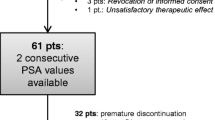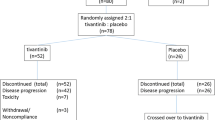Abstract
Irinotecan is a DNA topoisomerase I inhibitor that has a wide spectrum of activity against human tumors in both preclinical and clinical studies. To evaluate the efficacy of irinotecan in hormone-refractory prostate cancer, we conducted a phase II study in 15 men with metastatic, PSA-progressive disease after primary androgen deprivation. Irinotecan was administered at a dose of 125 mg/m2 weekly for four weeks followed by a two-week rest period; cycles were repeated every six weeks. Response was assessed by evaluation of serial changes in the serum PSA. None of fifteen patients had a decline in PSA of greater than 50%; eight patients had stable disease as a best response. None of three patients with measurable disease had a partial or complete response. Toxicity was primarily hematologic and gastrointestinal, with 40% of patients requiring dose modification due to granulocytopenia and 20% requiring intravenous fluid supplementation after development of diarrhea. There were no treatment-related deaths. We conclude that irinotecan in the dose and schedule used in this trial does not have significant activity against hormone-refractory prostate cancer.
Similar content being viewed by others
References
Small EJ, Vogelzang NJ: Second-line hormonal therapy for advanced prostate cancer: A shifting paradigm. J Clin Oncol 15: 382-388, 1997
Perry CM, McTavish D: Estramustine phosphate sodium: A review of its pharmacodynamics and pharmacokinetic properties, and therapeutic efficacy in prostate cancer. Drugs Aging 7: 49-74, 1995
Small EJ, Marshall ME, Reyno L, Meyers R, Natale R, Meyer M, Lenehan P, Chen L, Eisenberger M: Superiority of suramin + hydrocortisone (S + H) over placebo + hydrocortisone (P + H): Results of a multi-center double-blind phase III study in patients with hormone refractory prostate cancer (HRPC) (abstract). Proc Am Assoc Clin Oncol 17: 308a, 1998
Wasalenko JK, Dawson NA: Management of progressive metastatic prostate cancer. Oncology 11: 1551-1560, 1997
Tannock IF, Osoba D, Stockler MR, Ernst DS, Neville AJ, Moore MJ, Armitage GR, Wilson JJ, Venner PM, Coppin CM, Murphy KC: Chemotherapy with mitoxantrone plus prednisone or prednisone alone for symptomatic hormone-resistant prostate cancer: A Canadian randomized trial with palliative end points. J Clin Oncol 14: 1756-1764, 1996
Hudes GR, Greenberg R, Krigel RL, Fox S, Scher R, Litwin S, Watts P, Speicker L, Tew K, Comis R: Phase II study of estramustine and vinblastine, two microtubule inhibitors, in hormone-refractory prostate cancer. J Clin Oncol 10: 1754- 1761, 1992
Pienta KJ, Redman B, Hussain M, Cummings G, Esper PS, Appel C, Flaherty LE: Phase II evaluation of oral estramustine and oral etoposide in hormone-refractory adenocarcinoma of the prostate. J Clin Oncol 12: 2005-2012, 1994
Hudes GR, Nathan F, Khater C, Haas N, Cornfield M, Giantonio B, Greenberg R, Gomella L, Litwin S, Ross E, Roethke S, McAleer C: Phase II trial of 96-hour paclitaxel plus oral estramustine phosphate in metastatic hormone-refractory prostate cancer. J Clin Oncol 15: 3156-3163, 1997
Shelton G, Gerson H, Zuech N, Bagliella E, Benson M, Sawczuk I, Olsson C, Petrylak D: Activity of docetaxel (D) + estramustine (E) after dexamethasone (dex) treatment in patients with androgen insensitive prostate cancer (abstract). Proc Am Soc Clin Oncol 17: 343a, 1998
Hsiang YH, Liu LF: Identification of mammalian DNA topoisomerase I as an intracellular target of the anticancer drug camptothecin. Cancer Res 48: 1722-1726, 1988
Kawato Y, Furuta T, Aonuma M: Antitumor activity of a camptothecin derivative, CPT-11, against human tumor xenografts in nude mice. Cancer Chemother Pharmacol 28: 192- 198, 1991
Rougier R, Bugart R, Douillard JY, Culine S, Suc E, Brunet P, Becouarn Y, Ychou M, Marty M, Extra JM, Bonneterre J, Adenis A, Seitz JF, Ganem G, Namer M, Conroy T, Negrier S, Merrouche Y, Burki F, Mousseau M, Herait P, Mahjoubi M: Phase II study of irinotecan in the treatment of advanced colorectal cancer in chemotherapy-naïve patients and patients pretreated with flourouracil-based chemotherapy. J Clin Oncol 15: 251-260, 1997
Lievano G, Mirochnik Y, Rubenstein M, Shaw M, Guinan P: Antitumor effect of CPT-11, a new derivative of camptothecin, against human prostate cancer (PC-3) in vitroand prostate rat tumor (AT-3) in vivo: Methods Findings Exp Pharmacol 18: 659-662, 1996
Kelly WK, Scher HI, Mazumdar M, Vlamis V, Schwartz M, Fossa SD: Prostate-specific antigen as a measure of disease outcome in metastatic hormone-refractory prostate cancer. J Clin Oncol 11: 1566-1572, 1993
Smith DC, Dunn RL, Strawderman MS, Pienta KJ: Change in serum prostate-specific antigen as a marker of response to cytotoxic therapy for hormone-refractory prostate cancer. J Clin Oncol 16: 1835-1843, 1998
Small EJ, Srinivas S, Egan B, McMillan A, Rearden JP: Doxorubicin and dose-escalated cyclophosphamide with granulocyte colony-stimulating factor for the treatment of hormone-resistant prostate cancer. J Clin Oncol 14: 1617-1625, 1996
Sella A, Kilbourn R, Amato R, Bui C, Zukiwski A, Ellerhorst J, Logothetis CJ: Phase II study of ketoconazole combined with weekly doxorubicin in patients with androgen-independent prostate cancer. J Clin Oncol 12: 683-688, 1994
Colleoni M, Graiff C, Vicario G, Nelli P, Sgarbossa G, Pancheri F, Manente P: Phase II study of estramustine, oral etoposide, and vinorelbine in hormone-refractory prostate cancer. Am J Clin Oncol 20: 383-386, 1997
Fields S, Burris H, Wilding G, Eckardt J, O'Rourke T, Rinaldi D, Snetzer J, Bigley T, Hohneller J, Von Hoff D: Evaluating the role of navelbine in hormone-refractory prostate cancer. Proc Am Soc Clin Oncol 13: 727, 1994
Moore MJ, Osoba D, Murphy K, Tannock IF, Armitage A, Findlay B, Coppin C, Neville A, Venner P, Wilson J: Use of palliative endpoints to evaluate the effects of mitoxantrone and low-dose prednisone in patients with hormonally resistant prostate cancer. J Clin Oncol 12: 689-694, 1994
Hudes GR, Kosierowski R, Greenberg R, Ramsey HE, Fox SC, Ozols RF, McAleer CA, Giantonio BJ: Phase II study of topotecan in metastatic hormone-refractory prostate cancer. Invest New Drugs 13: 235-240, 1995
Author information
Authors and Affiliations
Rights and permissions
About this article
Cite this article
Reese, D.M., Tchekmedyian, S., Chapman, Y. et al. A phase II trial of irinotecan in hormone-refractory prostate cancer. Invest New Drugs 16, 353–359 (1998). https://doi.org/10.1023/A:1006120910380
Issue Date:
DOI: https://doi.org/10.1023/A:1006120910380




